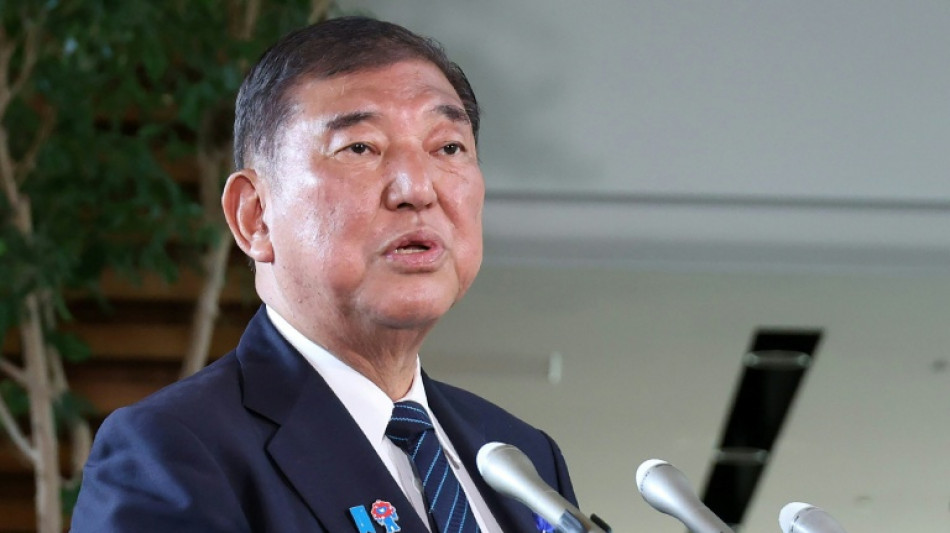
-
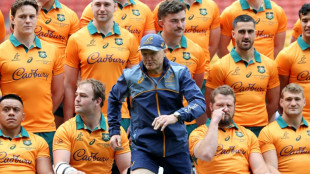 Schmidt says Wallabies must hit the ground running in Melbourne
Schmidt says Wallabies must hit the ground running in Melbourne
-
Rodriguez stops Cafu in super flyweight unification fight

-
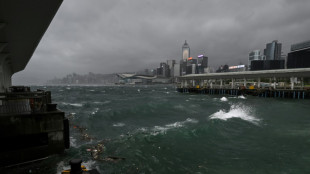 Hong Kong axes flights, classes as Typhoon Wipha approaches
Hong Kong axes flights, classes as Typhoon Wipha approaches
-
Fundora batters Tszyu to retain WBC superwelter crown

-
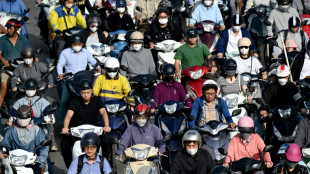 Hanoi scooter riders baulk at petrol-powered bikes ban
Hanoi scooter riders baulk at petrol-powered bikes ban
-
'Tiger like' Scheffler set to spoil McIlroy dream in British Open finale

-
 Japan sees bright future for ultra-thin, flexible solar panels
Japan sees bright future for ultra-thin, flexible solar panels
-
Driver charged after plowing into Los Angeles nightclub crowd, injuring 30

-
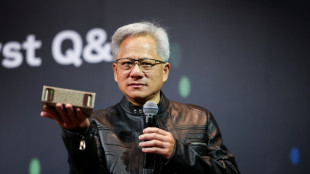 Jensen Huang, AI visionary in a leather jacket
Jensen Huang, AI visionary in a leather jacket
-
Restoring sea floor after mining may not be possible, researchers warn

-
 Sunbears to elephants: life at a Thai wildlife hospital
Sunbears to elephants: life at a Thai wildlife hospital
-
Messi double as Miami bounce back against Red Bulls

-
 Dozens dead in Vietnam after Ha Long Bay tourist ferry sinks
Dozens dead in Vietnam after Ha Long Bay tourist ferry sinks
-
England complete unbeaten tour with 40-5 rout of USA

-
 Lions 'in good place' but wary of wounded Wallabies in second Test
Lions 'in good place' but wary of wounded Wallabies in second Test
-
'Discipline' behind heavyweight chamopion's Usyk desire to box on after knocking out Dubois

-
 Ten-woman Germany in Euros semis after stunning shootout win over France
Ten-woman Germany in Euros semis after stunning shootout win over France
-
Germany's Berger 'living best life' after Euros shootout heroics

-
 Usyk knocks out Dubois to become undisputed world heavyweight champion
Usyk knocks out Dubois to become undisputed world heavyweight champion
-
Ten-woman Germany beat France on penalties to reach Euro 2025 semis

-
 Usyk beats Dubois to become undisputed world heavyweight champion
Usyk beats Dubois to become undisputed world heavyweight champion
-
Gaza civil defence says Israeli fire kills 39 near two aid centres

-
 Ahly ban star striker Abou Ali from training camp
Ahly ban star striker Abou Ali from training camp
-
Erasmus has mixed views after nine-try Springboks beat Georgia

-
 US tech CEO in viral Coldplay concert video resigns
US tech CEO in viral Coldplay concert video resigns
-
Japan PM faces reckoning in upper house election
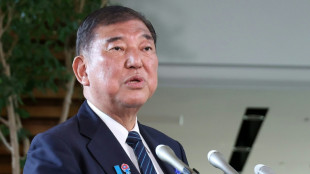
-
 Druze regain control of Sweida city after Syria announces ceasefire
Druze regain control of Sweida city after Syria announces ceasefire
-
Winning majors 'not easy' warns Scheffler despite British Open lead

-
 Dominant Scheffler stretches four shots clear at British Open
Dominant Scheffler stretches four shots clear at British Open
-
'Inevitable' Scheffler tough to catch, even for McIlroy

-
 Clashes, homes torched in south Syria's Sweida despite ceasefire
Clashes, homes torched in south Syria's Sweida despite ceasefire
-
Ukraine proposes fresh peace talks with Russia next week

-
 Gaza civil defence says Israeli fire kills 32 near two aid centres
Gaza civil defence says Israeli fire kills 32 near two aid centres
-
Young Swede Solberg extends Rally Estonia lead

-
 NHL all-time record scorer Ovechkin calls for Russian return to global sports
NHL all-time record scorer Ovechkin calls for Russian return to global sports
-
Memorable Moodie try highlights big win by Springboks

-
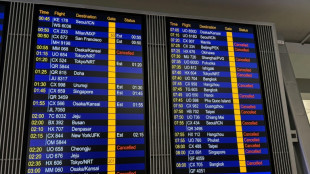 Hong Kong axes flights, classes as Typhoon Wipha nears
Hong Kong axes flights, classes as Typhoon Wipha nears
-
Girelli says Italy's 'time has come' ahead of England Euros showdown

-
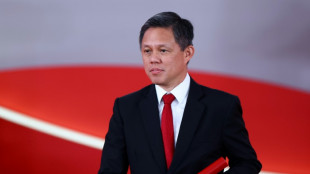 Singapore military helps battle cyberattack: minister
Singapore military helps battle cyberattack: minister
-
Bid to bring back pesticide in France sparks unprecedented petition
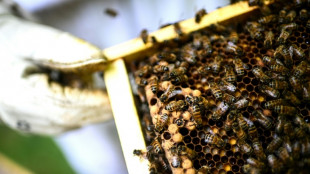
-
 Arensman climbs to misty Tour de France win as Pogacar extends lead
Arensman climbs to misty Tour de France win as Pogacar extends lead
-
Arensman climbs to Tour de France stage win as Pogacar extends lead

-
 Rashford closing in on Barcelona move: reports
Rashford closing in on Barcelona move: reports
-
Alfred coasts in London, but Lyles pipped in season-opening 100m

-
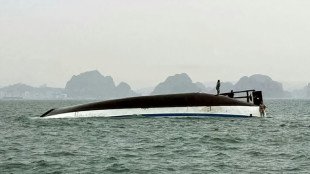 Tourist boat capsizes in Vietnam's Ha Long Bay, leaving 34 dead
Tourist boat capsizes in Vietnam's Ha Long Bay, leaving 34 dead
-
Seville outshines Olympic champion Lyles in Diamond League 100m

-
 Seville outshines Olympic champion Lyles in season-opening 100m
Seville outshines Olympic champion Lyles in season-opening 100m
-
Marc Marquez wins Czech MotoGP sprint race

-
 Schmidt proud of Wallabies fight but wants improvement for second Test
Schmidt proud of Wallabies fight but wants improvement for second Test
-
Ceasefire order fails to halt fighting in Syria's Druze heartland


Japan PM faces reckoning in upper house election
Japanese Prime Minister Shigeru Ishiba faces a reckoning from voters on Sunday with upper house elections that could end his premiership and see a right-wing populist party make inroads.
With many Japanese hurt by rising prices, especially for rice, opinion polls suggest that Ishiba's governing coalition could lose its majority in the upper house.
This could be the final nail for Ishiba, having already been humiliatingly forced into a minority government after lower house elections in October.
"Ishiba may need to step down," Toru Yoshida, a politics professor at Doshisha University, told AFP.
Japan could "step into an unknown dimension of the ruling government being a minority in both the lower house and the upper house, which Japan has never experienced since World War II," Yoshida said.
Ishiba's centre-right Liberal Democratic Party (LDP) has governed Japan almost continuously since 1955, albeit with frequent changes of leader.
Ishiba, 68, a self-avowed defence "geek" and train enthusiast, reached the top of the greasy pole last September on his fifth attempt and immediately called elections.
But this backfired and the vote left the LDP and its small coalition partner Komeito needing support from opposition parties, stymying its legislative agenda.
"Energy prices have swung sharply in recent months, as the government has flip-flopped between removing aid for household energy bills and adding new supports," said Stefan Angrick at Moody's Analytics.
- Trumped -
Out of 248 seats in the upper house, 125 are up for grabs on Sunday. The coalition needs 50 of these to keep a majority.
Not helping is lingering resentment about an LDP funding scandal, and US tariffs of 25 percent due to bite from August 1 if there is no trade deal with the United States.
Japan's massive auto industry, which accounts for eight percent of the country's jobs, is reeling from painful levies already in place.
Weak export data last week stoked fears that the world's fourth-largest economy could tip into a technical recession.
Despite Ishiba securing an early meeting with US President Donald Trump in February, and sending his trade envoy to Washington seven times, there has been no accord.
Trump last week poured cold water on the prospects of an agreement, saying Japan won't "open up their country".
"We will not easily compromise," Ishiba said earlier this month.
Ishiba's apparently maximalist strategy of insisting all tariffs are cut to zero -- although this could change post-election -- has also drawn criticism.
"How well his government is able to handle negotiations over US tariffs is extremely important, as it's important for the LDP to increase trust among the public," Masahisa Endo, politics professor at Waseda University, told AFP.
- 'Japanese first' -
The last time the LDP and Komeito failed to win a majority in the upper house was in 2010, having already fallen below the threshold in 2007.
That was followed by a rare change of government in 2009, when the now-defunct Democratic Party of Japan governed for a rocky three years.
Today the opposition is fragmented, and chances are slim that the parties can form an alternative government.
One making inroads is the "Japanese-first" Sanseito, which opinion poll suggest could win more than 10 upper house seats, up from two now.
The party wants "stricter rules and limits" on immigration, opposes "globalism" and "radical" gender policies, and wants a re-think on decarbonisation and vaccines.
Last week it was forced to deny any links to Moscow -- which has backed populist parties elsewhere -- after a candidate was interviewed by Russian state media.
"They put into words what I had been thinking about but couldn't put into words for many years," one voter told AFP at a Sanseito rally.
S.Abdullah--SF-PST

